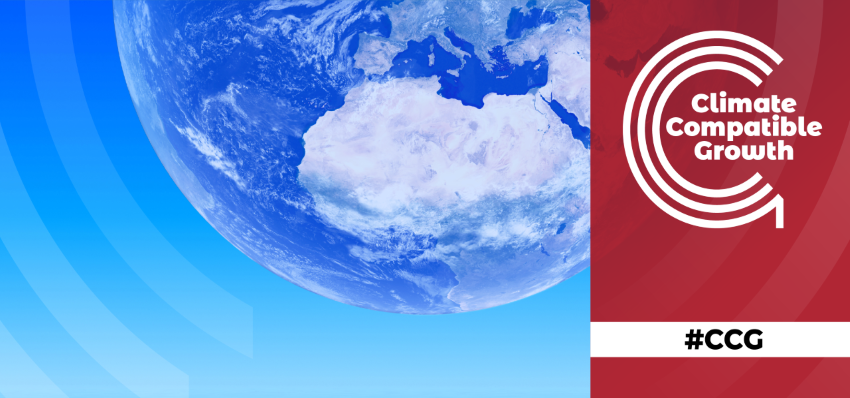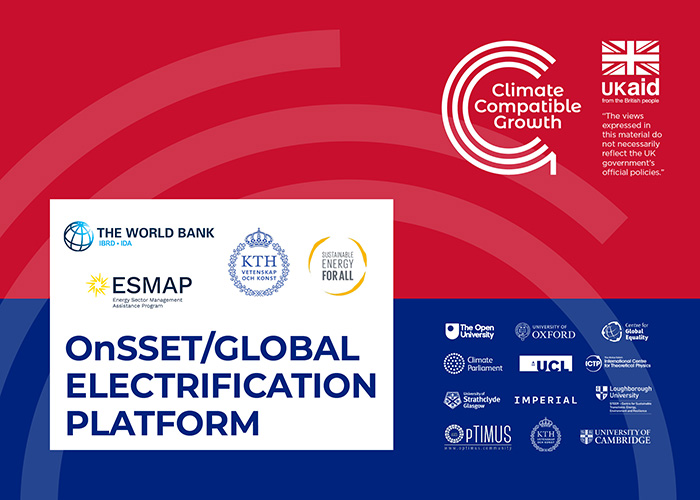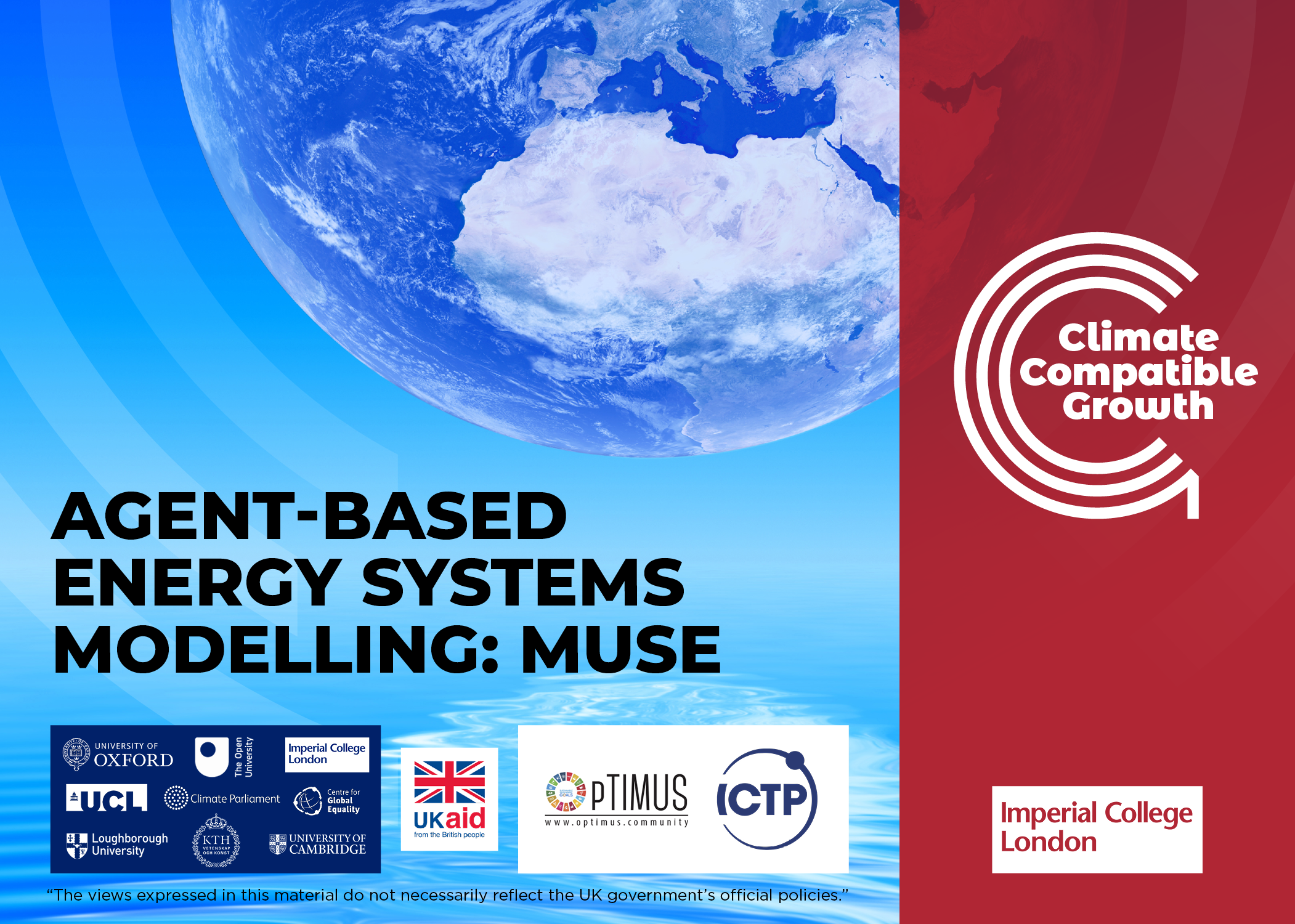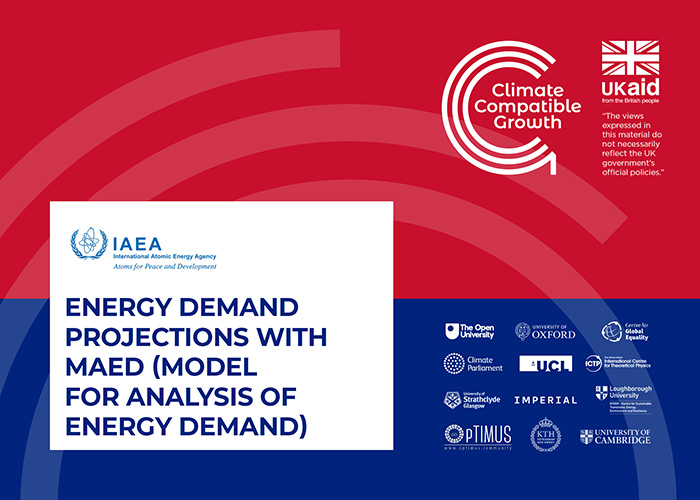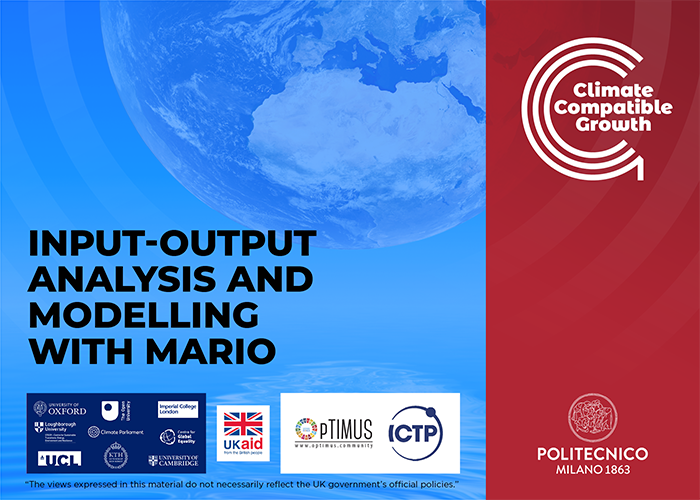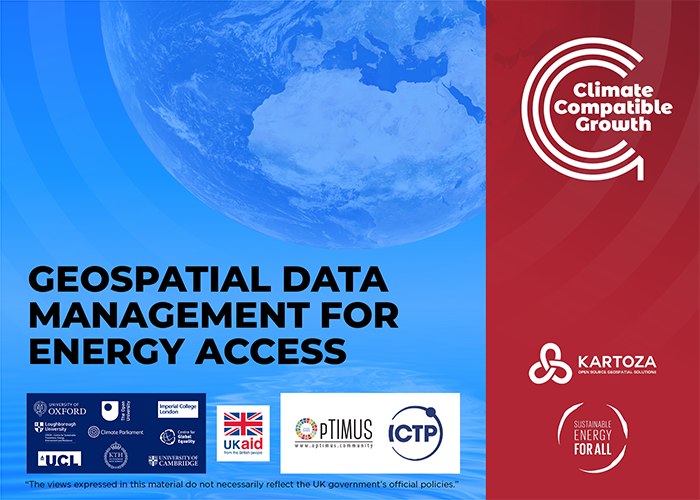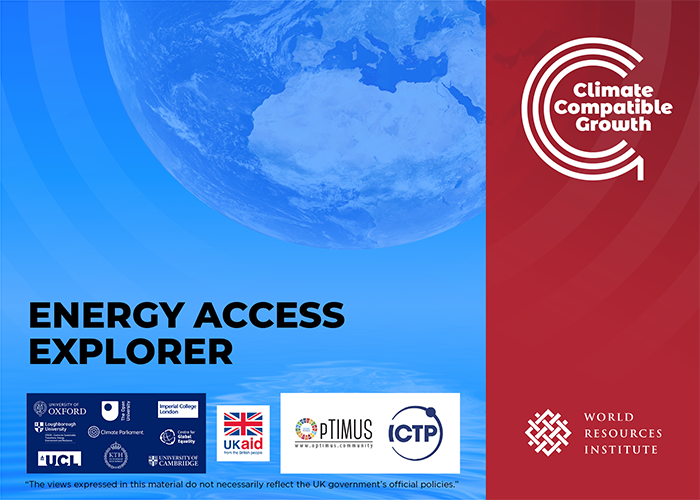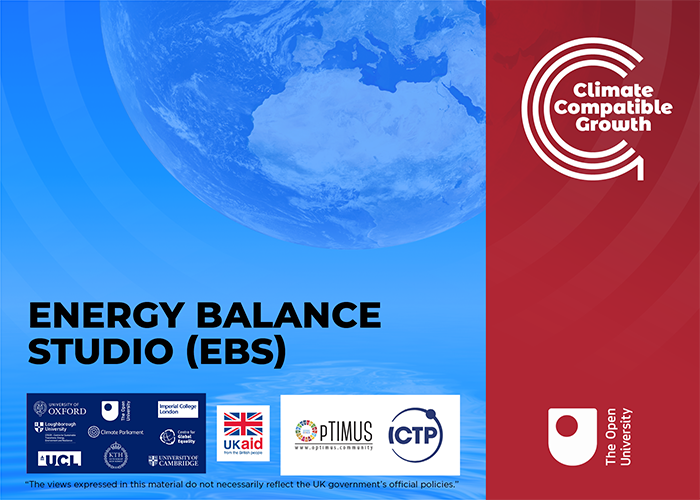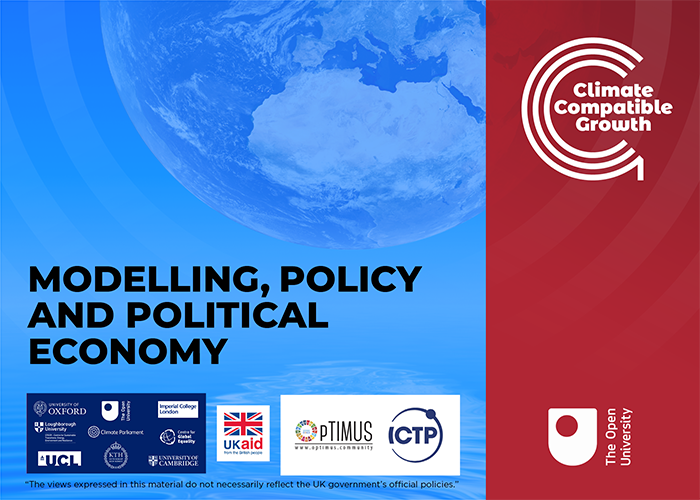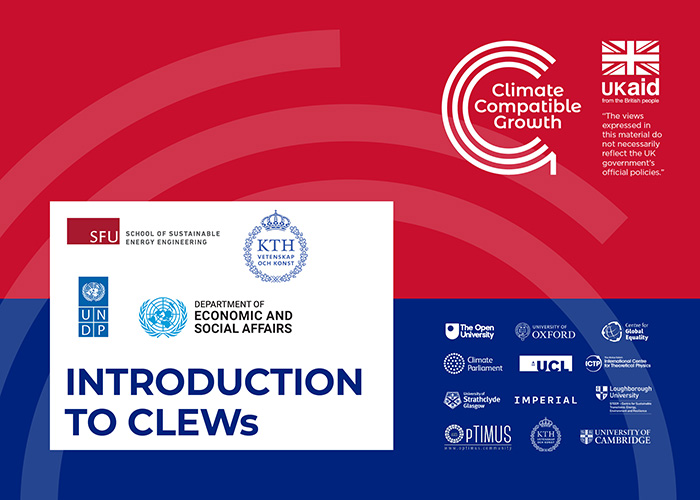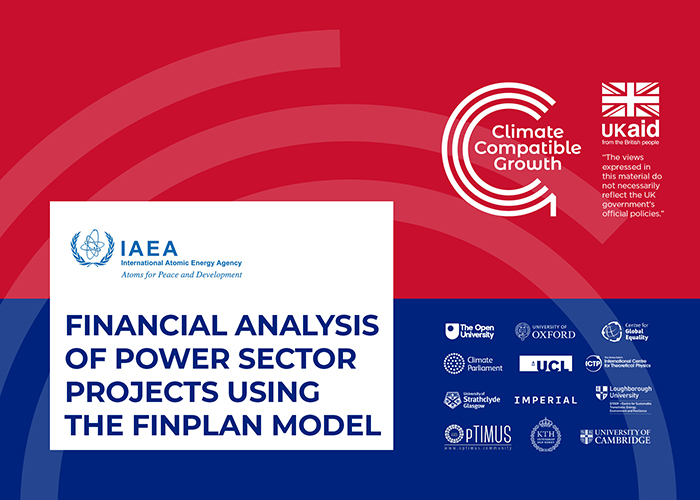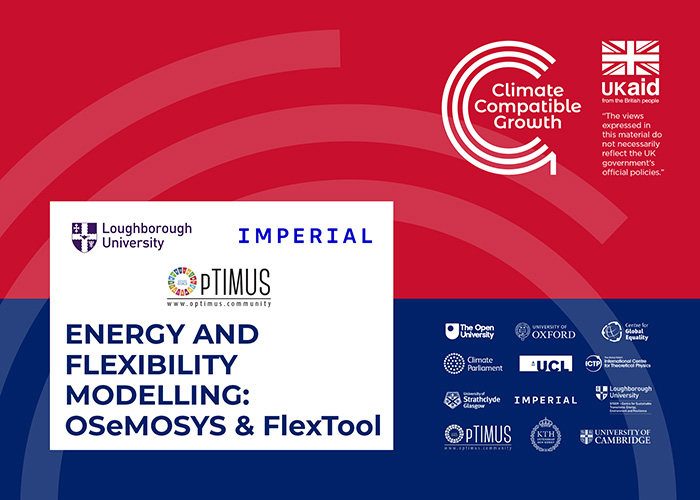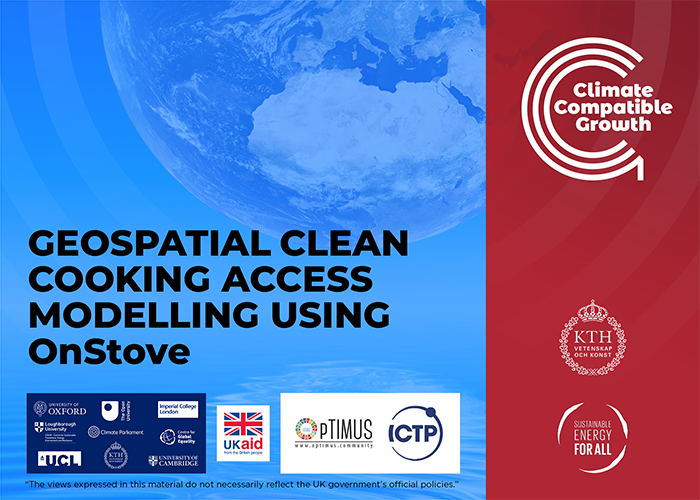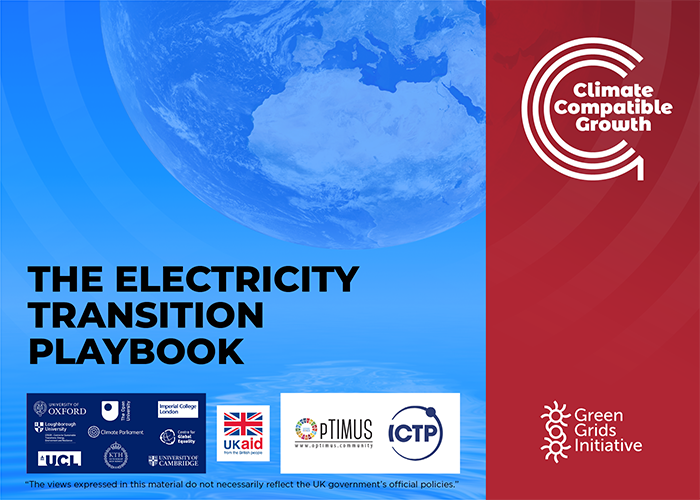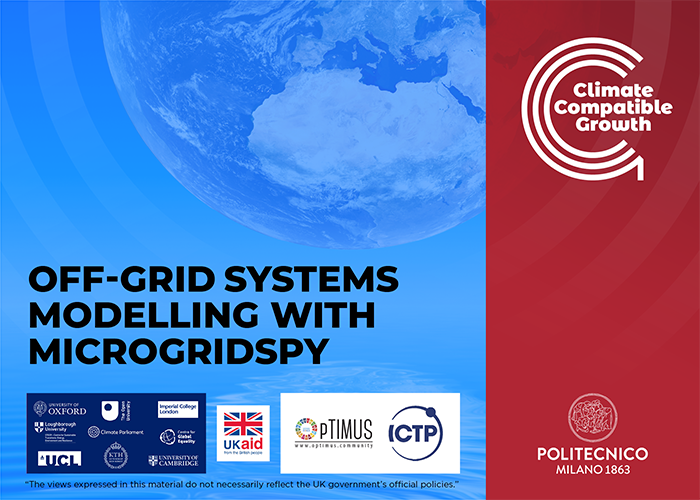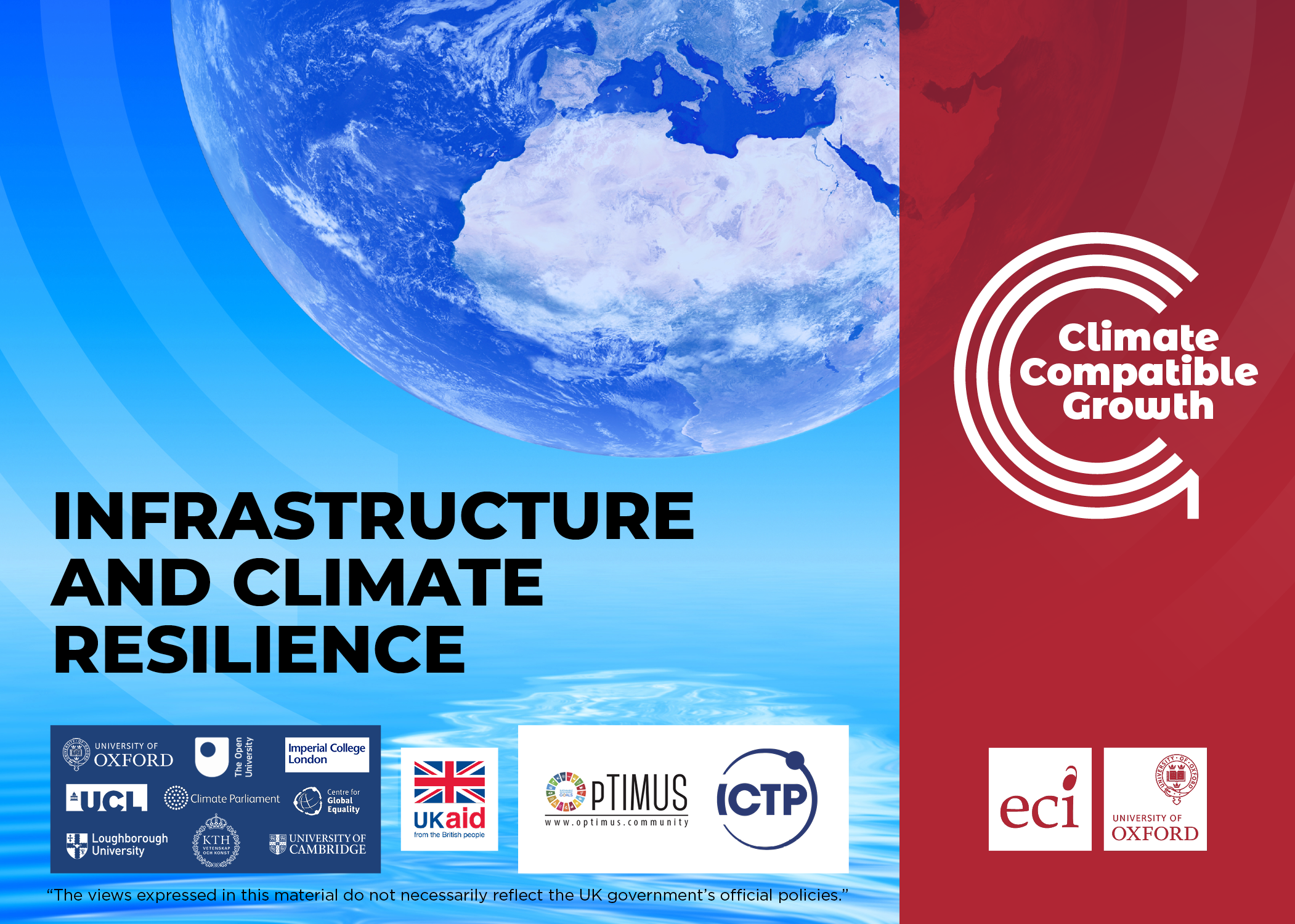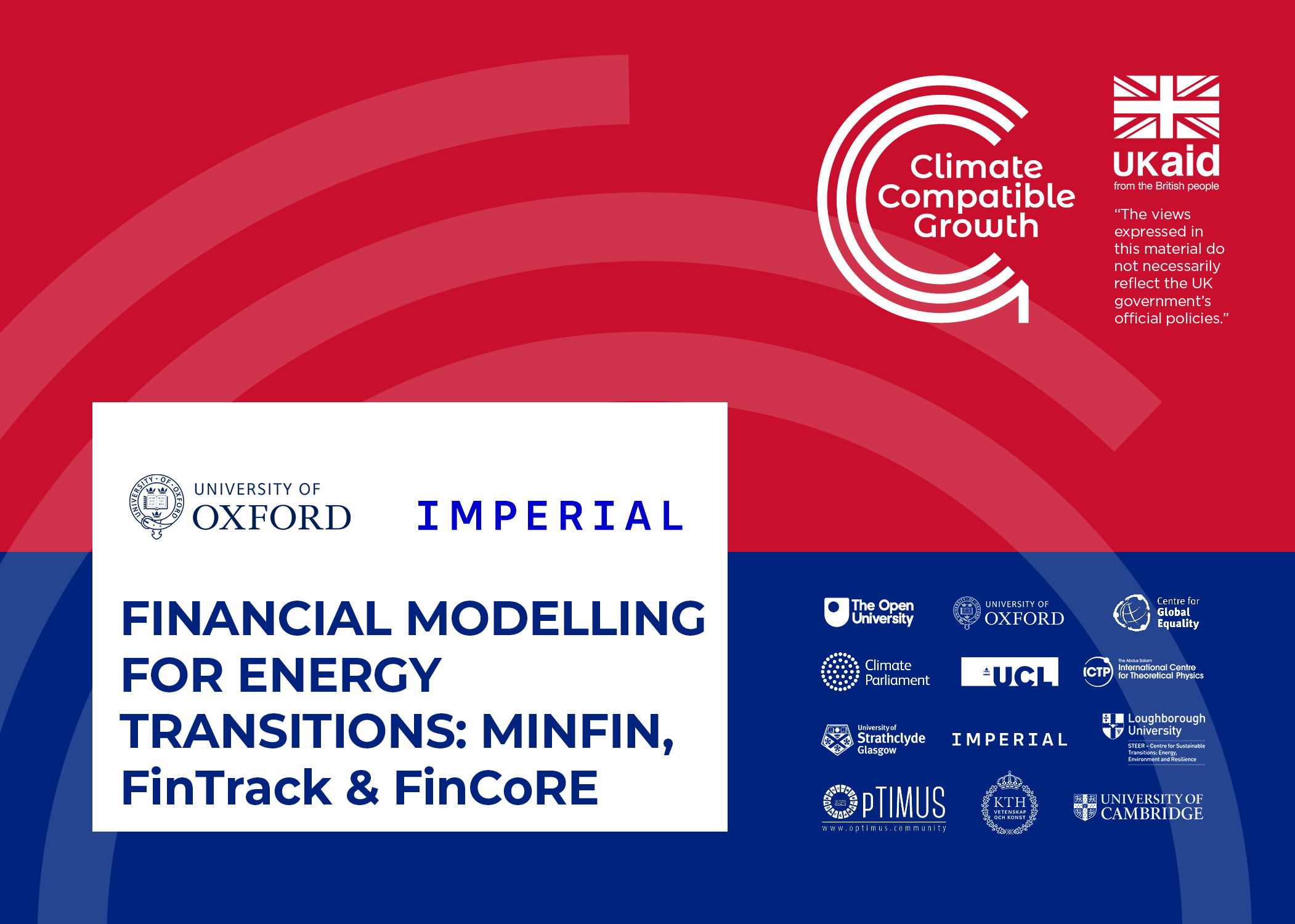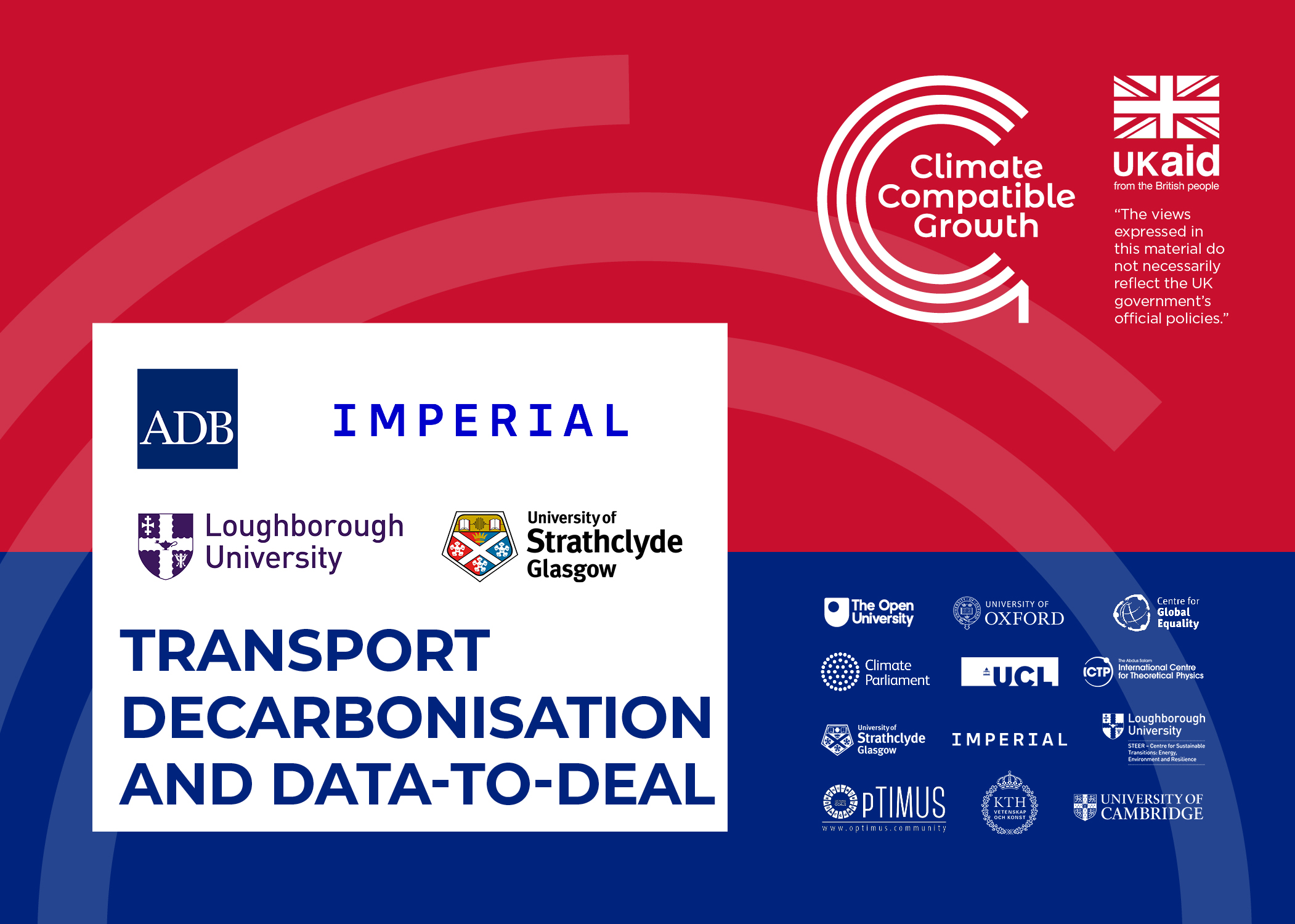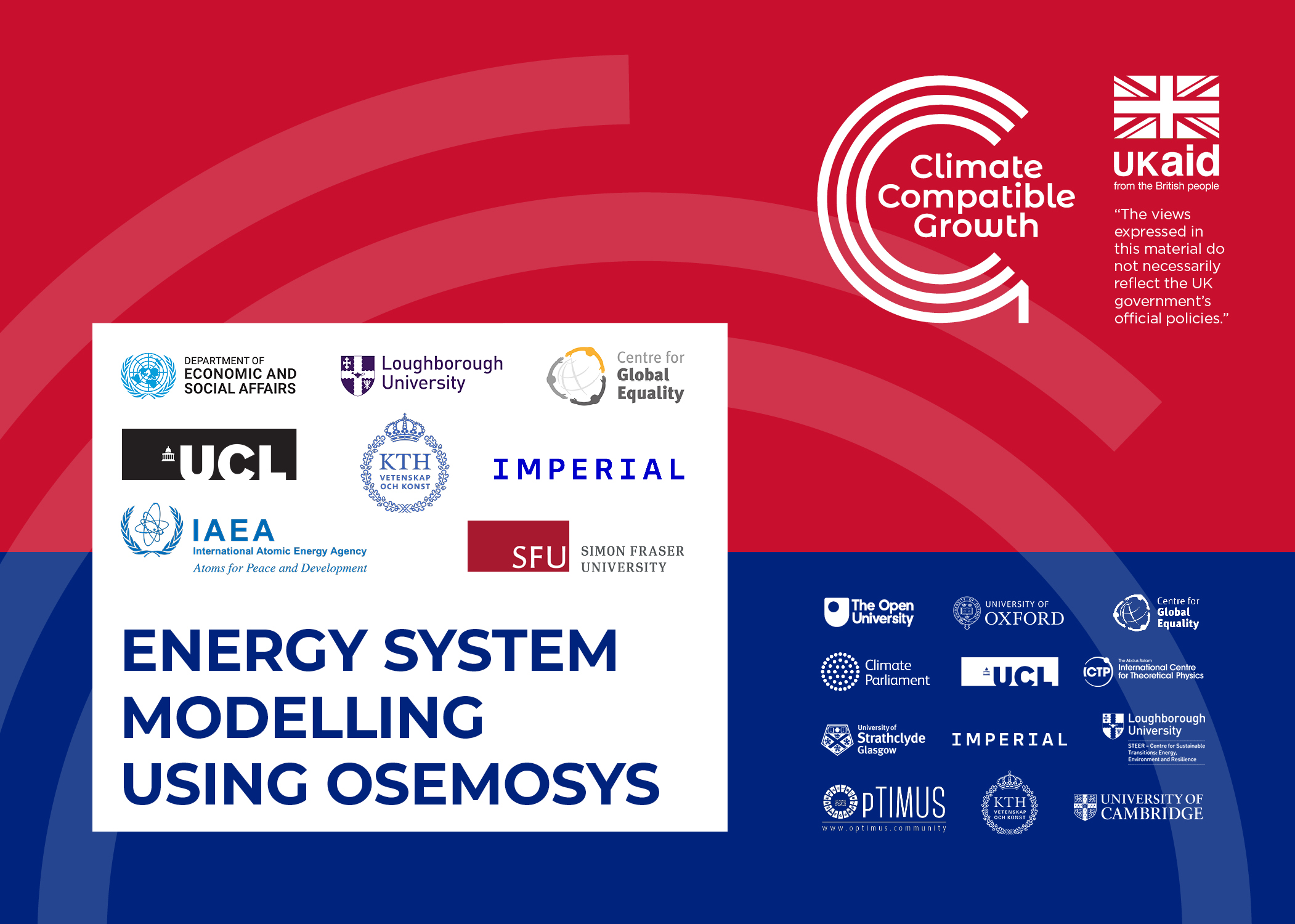This collection is developed by a set of important UN and International Organizations together with the Climate Compatible Growth (#CCG) program. They focus on simple toolkits used to develop energy balances; energy projections; energy investment; emissions and renewable integration modelling; integrated Climate, Land, Energy, and Water modelling; system of systems modelling; and basic energy infrastructure financing.
Climate Compatible Growth (#CCG) is a UK government, ODA-funded research programme supporting investment in sustainable energy and transport systems to meet development priorities.
We believe in partnership. These courses are open to all and we invite you to join us as we join with others to develop capacity for better evidence-based policy making with analysts and academics from across the world. The tools are open source and have been developed by forward-looking organizations, who know the importance of community accessibility, continuous improvement, and accountability.
We believe that the future needs to be co-created with open minds and with shared knowledge and tools. Alone you can go fast, together we can go far. Please watch the video below for an introduction to the purpose and importance of these courses. It is recommended that you hold down the Crtl button on your keyboard and click on the link below to open it in a new window.
Transcript
MARK HOWELLS [00:00:00] Welcome to the virtual Sustainable Development Summer School courses that are developed by a set of important UN and international organisations together with the Climate Compatible Growth Programme, CCG
CARLA CANNONE [00:00:13] The courses being developed in the school focus on simple toolkits used to develop energy balances.
STEPHANIE HIRMER [00:00:18] Energy projections, energy investment.
SATHEESH KRISHNAMURTHY [00:00:21] More importantly, the emissions and renewable energy integrations.
STEPHANIE HIRMER [00:00:26] Integrated climate, land, energy and water modelling.
CARLA CANNONE [00:00:30] System of system modelling.
STEPHANIE HIRMER[00:00:31] And basic energy infrastructure financing.
SATHEESH KRISHNAMURTHY [00:00:34] All these are essential components that are addressing the big issue of climate change.
CARLA CANNONE [00:00:40] CCG is a UK government, ODA-funded research programme.
SATHEESH KRISHNAMURTHY [00:00:45] Supporting investment in sustainable energy and transport system to meet the development priorities.
MARK HOWELLS [00:00:51] We believe in partnership.
STEPHANIE HIRMER [00:00:53] Please join us as we join with others to develop capacity for better evidence-based policymaking.
MARK HOWELLS [00:00:59] With analysts and academics from around the world.
CARLA CANNONE [00:01:02] In the training courses, you will find material that comes from a teaching kit.
SATHEESH KRISHNAMURTHY [00:01:06] Very simple teaching kit.
CARLA CANNONE [00:01:07] that you are free to use and adapt for your own knowledge management, teaching and research activities.
SATHEESH KRISHNAMURTHY [00:01:14] I mean, it is free to use because they are open learn sources from Open University.
MARK HOWELLS [00:01:19] We invite you to join us.
CARLA CANNONE [00:01:21] The tools are open source.
STEPHANIE HIRMER [00:01:22] And have been developed by forward looking organisations who know the importance of community accessibility
SATHEESH KRISNAMURTHY [00:01:28] and continuous improvement and accountability.
MARK HOWELLS[00:01:31] We believe that the future needs to be co-created.
CARLA CANNONE[00:01:34] With open minds and with shared knowledge and tools
SATHEESH KRISNAMURTHY [00:01:38] Alone you can go fast. Together we can go far.
YACOB MULUGATTA [00:01:43] Sustainable development is vital because it allows us to address interlocking goals that we have in society, interlocking goals as in the social, the economic and environmental challenges that we face
BENJAMIN STEWART [00:02:01] The world has limited has resources. And if we expect to bring the rest of the world up the level of development that we desire, there are limitations to that. And I think that that's the basic concept of sustainable development.
WISDOM AHIATAKU-TOGOBO [00:02:14] We all know the effects of climate change, especially on developing countries, including Ghana. So any intervention we take, we make sure that we factor climate change in it, just to make sure that at least we don't increase our carbon footprints. But we want to do it in a more sustainable, economically available manner.
LINUS MOFOR [00:02:48] It is important for the global south to drive the agenda because this is where the biggest development gap is.
BENJAMIN STEWART [00:02:54] We need to make our development partners our developed, developing countries, the drivers of this of this work,
ILSE BERDELLANS-ESCOBAR [00:03:02] At international level, at community level, we could support their implementation, we could support whatever the country's needs for going in this direction, but it should be an activity that should be done in delegation and should be done through the countries and from the countries themselves.
MERON TESFAMICHAEL [00:03:22] Obviously, planning is important because ownership and planning process is a singular importance for a sustainable development, and so a reliable and up-to-date planning that sets the foundation for effective policies and investment strategies and targets.
LINUS MOFOR [00:03.42] First of all, you need the investments, but you need the investments, you need some kind of planning, need to have some kind of understanding of what is needed. How should it be invested? Where should it be invested? Why should you invest in say a lot more clean energy?
YACOB MULUGATTA [00:03.58] So we have modelling tools. We have policy tools. We have we will have tools that allow us to plan at cross-sector levels between energy and transport. But while that's crucial and important, it's also critical that these tools are able to respond to real problems on the ground.
WISDOM AHIATAKU-TOGOBO [00:04:26] We want to assure affordable energy. For all. All the population of this country to have affordable energy for economic socio-economic development and for stimulating industrialisation.
LINUS MOFOR [00:04:46] It becomes very important for countries to look at the energy scenario, to look at the development scenarios, the energy scenarios that are needed for those, and then see what are the optimal mixes of technologies that avoid the lock in that could happen with high polluting, inefficient technologies and forms of energy going forward. So energy planning is extremely important.
BENJAMIN STEWART [00:05:17] The reason that spatial planning is so important in this is that the effects of climate change are not homogenous over the landscape. Certain places are affected a lot more than others. And those places that are affected generally are often places that face higher levels of poverty, lower levels of development, you know things like droughts, floods, a lot of these are places that are already fairly poor.
LINUS MOFOR [00:05.42] Climate change, does not discriminate. It happens everywhere. But some people are more resilient than others to respond and manage climate change. But if we are not all safe, then nobody else is safe.
HOLGER ROGNER [00:06:03] You have to share. You have to learn from each other and open source platform allows this much easier. You can have communities of practice where you get the people together. One has figured it out long time before the others. And why should they reinvent the wheel? You can learn together and develop much faster.
BENJAMIN STEWART [00:06:25] So openness, transparency we’ve really spent a lot of time focusing on open source development, open code development, open platform development, because I think transparency is important.
LINUS MOFOR [00:06.42] It is extremely important because being open source means it's a bottom up and the idea of the community then is that there is a shared learning and, and that shared learning is what makes the tools better as we go forward.
FRANZISKA BOCK [00:06:56] We work together with government and researchers and different partner countries in order to develop tools, bottom up and make them useful for evidence-based policymaking. In this process we always see, even though there’s international institute involved in the process, how much knowledge really, of course, comes from the national experience. So having this knowledge integrated and learning from participants in such courses in order to improve models, data collection, data management, more generally speaking, is absolutely crucial to make those models, those tools, better for the future and more flexible also for different contexts.
YACOB MULUGATTA [00:07.37] The benefit is all around, both for the users as well as those who are producing the material.
WISDOM AHIATAKU-TOGOBO [00:07.43] We are happy to learn, acquire more skills. If they are available, practical and sustainable, we are happy to apply them and get them on board.
FRANZISKA BOCK [00:07.57] It's a great starting point really for people around the world to get started with energy modelling.
This site provides access via hypertext links to resources in other web sites for browsing only and in so doing we are not endorsing any linked entities nor authorising any act which may be in breach of copyright or any other third party rights which are protected in law or by international treaties world-wide. Please be aware these external sites usually have their own terms and conditions.
-
Energy Demand Projections with MAED (Model for Analysis of Energy Demand)
This course introduces long term energy demand simulation and power demand profile generation using the International Atomic Energy Agency's Model for Analysis of Energy Demand (MAED). Participants will learn the basics of setting upa model, calibrating it, and running scenarios.
Course
20 hrs
-
Input-Output analysis and modelling with MARIO
The main goal of the course is to introduce you to the fundamentals of quantitative impact assessment methods and models. These quantitative models are specifically designed to assess the prospective environmental and economic impacts resulting from the application of technological or policy interventions at meso and macro-scale, comprehensively including supply-chain effects in a Life Cycle perspective.
Course
40 hrs
-
Energy and Flexibility Modelling: OSeMOSYS & FlexTool (MAC)
(MAC version) Participants will learn to use energy modelling tools to understand the investments needed to meet growing energy demands alongside environmental and energy security constraints, while assessing system flexibility to account for high renewables penetration.
Course
32 hrs
-
Energy and Flexibility Modelling: OSeMOSYS & FlexTool (Windows)
(WINDOWS version) Participants will learn to use energy modelling tools to understand the investments needed to meet growing energy demands alongside environmental and energy security constraints, while assessing system flexibility to account for high renewables penetration.
Course
32 hrs
-
Geospatial clean cooking access modelling using OnStove
In this course you will be introduced to OnStove, an open-source spatial clean cookingtool identifying the best cooking solutions across any given area based on their costsand benefits. The track will take you from start to finish, from creating your own spatialrepository to modifying your spatial data, calculating the net-benefits of differentcooking solutions and lastly visualizing and presenting your results.
Course
32 hrs
-
Off-Grid Energy Systems Modelling with MicroGridsPy
Explore the computational aspects of energy system modelling, delve into the technological components of third-generation minigrids, and discover MicroGridsPy, an open-source Python framework for optimal sizing of minigrids.
Course
40 hrs
-
Financial Modelling for Energy Transitions MINFin, FinTrack & FinCoRE
This course provides participants with the skills to assess the financial viability of energy transition investments, using financial modelling tools. It features MINFin, a model for identifying climate finance gaps, as well as FinTrack and FinCoRE, tools for tracking funding sources and estimating renewable energy costs.
Course
15 hrs
-
Energy System Modelling using the Modelling User Interface for OSeMOSYS (MUIO)
This course provides a comprehensive introduction to energy system modelling using OSeMOSYS, a linear programming optimization tool for long- term energy planning and policy analysis.
Course
20 hrs

